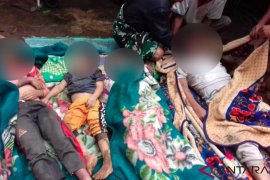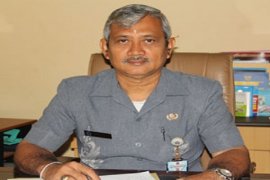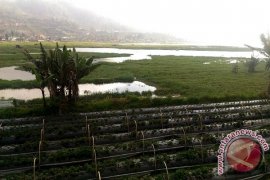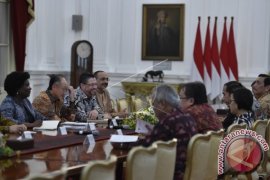Buleleng, (Antara Bali). - Bali, a world famous tourist destination,
is a predominantly Hindu island. However, not many know that there is a
village there with Muslims making up the majority amid Hinduism
environment.
The village is named Pegayaman, located in a mountainous area in
the northern part of the island - to be precise in the sub-district of
Sukasada, Regency of Buleleng, around 90 kilometers north of the
provincial city Denpasar.
The village of Pegayaman is like any other villages in Bali,
known for their hospitality , generous behavior toward guests. The
people speak Balinese as most people in Bali. What makes the village
different from other villages in the island is that there is no house
with Pura (Balinese temple) ornaments as generally found in the houses
of Balinese Hindus.
It was just luck that on May 20, 2017, coinciding with the
109th National Awakening Day, I met with a number of community leaders
in the village of Pegayaman and witnessed the beauty of life with
religious tolerance.
The first community leader I met at the village was Komang
Sohihul Islam, who is chairman of the Village Deliberation Body (BPD).
Komang said that religious tolerance in that village dates back to
hundreds of year earlier. Muslim people have lived in that village when
the Kingdom of Buleleng was established under Ki Barak Panji Sakti in
early the 16th century.
"We are taught by our elders about what we believe and about
our faith. For the villagers of Pegayaman, everyone is brother. It has
been so from the beginning, before we begin to talk much about
tolerance," Komang said.
He said there is a friendly word in Balinese for Hindus and
Muslims in the village. Hindus are called "Nyame Hindu" or `Hindu
brother` in in Indonesian language, and Muslims are called "Nyame
Selam" meaning Muslim brother.
"We believe people of any faith in the world are brothers.
There is no different in true love. Religion is a matter of faith and
any faith should be respected. You could not force anyone to follow you
in faith," he said.
Currently, radicalism has begun a hot topic in public debates ,
he said, adding radicalism , which has disrupted harmony in life in a
number of countries in the world should be subjugated with love not by
force.
"In our village everyone is called `Nyame`. If we are brothers
why we should oppose against each other. Brothers should love each
other, should not they ?" he said.
Acculturation of Tradition and Names
Not only that , another community leader who is village secretary
Ketut Hatta Amrullah said followers of different faiths in the village
have certain system of acculturation in their religious holidays.
Muslims in the village of Pegayaman have a tradition almost the
same as that of other Balinese in general such as the tradition of
"Penampahan" or the day to slaughter livestock ahead of the last day of
religious holy day. It is not a Hindu teaching. It is a Balinese
tradition. All Muslims celebrate religious holy days such as Eid al
Fitr, Maulid Nabi (Prophet Muhammad`s birthday)y and Eid al Adha with
Penampahan.
"In celebrating religious holy days, we always observe our
traditional culture of `Ngejot` or giving various kinds of food to the
"Nyame Hindu".
It is the same with the celebration of the Hinduism holy days.
The Hindus will do the same when celebrating their religious holy days.
"Certainly it is agreed upon that they would not give us food containing
porch, which is forbidden to be eaten by Muslims." he said.
There is also a tradition to make dummy like `ogoh ogoh in
celebrating Eid al Fitr every year, he said, adding it is not a
tradition belonging to a certain religion - It is Balinese tradition.
"The villagers still hold the tradition until now. Why we should
bury a culture, which is not prohibited by the religion? In fact with
that tradition we have developed and maintained a feeling of
togetherness," he said.
He also said there is another tradition that shows high tolerance
and acculturation in Pegayaman , that is the use of the typical
Balinese names before one`s name such as Wayan, Kadek, Made, Komang
and Ketut. The difference in Pegayaman, however, is that the name of
Ketut for a fourth child is also used for the fifth and the next and
next.
"If there is a sixth child and more children born, the name of
Ketut is still use. It is different with Bali in general, which use the
name of the first born -- Gede or Putu - for the sixth and ones born
later," he explained.
There are still more traditions such as "Sokok Basa" or an
offering that consists of skewered eggs and placed on Baten Pajegan,
still maintained in the village.
Awake from Differences
One form of togetherness in the village of Pegayaman is that
pecalang or security officers of traditional villages are always
involved or take part in the celebration of religious holy days such
as Eid al Fitr, Eid al Adha, etc.
"That has been a long tradition dating back to time unknown when
there had not been police organization. Pecalang assume the police duty
in each traditional village in Bali, Jero Lingga, the Bendesa Pakraman
of traditional village of Amertesari, in the village of Pegayaman,
said.
Jero Lingga said as a leading Hindu figure in the village, he has
good relations with all Islamic leaders in that area in the village, or
in Pesantren (Islamic boarding school).
"We seek to settle any problem through deliberation. We always
attach importance to togetherness among the villagers regardless of
their religions," he said.
He said he hoped the village of Pegayaman will continue to serve
as an example of tolerance in Bali even in Indonesia. Especially now,
the country will need greater tolerance with the emergence of
radicalism that could lead to threatening the national integrity, he
said.
"The momentum of the National Awakening Day should be used to
strengthen tolerance, and hopefully the Pegayaman village could serve
as a pioneer in developing and maintaining religious harmony," he said.
He said the Indonesian youths should not degrade themselves by
taking part in a slanging match, spreading hoaxes and denouncing each
other.
"Our forefathers had given a good example of high tolerance
showing that the nation has been built with unity, mutual help,
deliberation, mutual respect and any form of togetherness," he said.
The tradition has been preserved and maintained in the small
village of Pegayaman, amid the threat of radicalism that could ruin what
"we have developed with difficulty over the past year4s," he said. (WDY)
Video : I Made Bagus Andi Purnomo
Tolerance In A Muslim Village In Predominantly Hindu Island (video)
Pewarta : I Made Bagus Andi Purnomo 21 Mei 2017 19:52 WIB
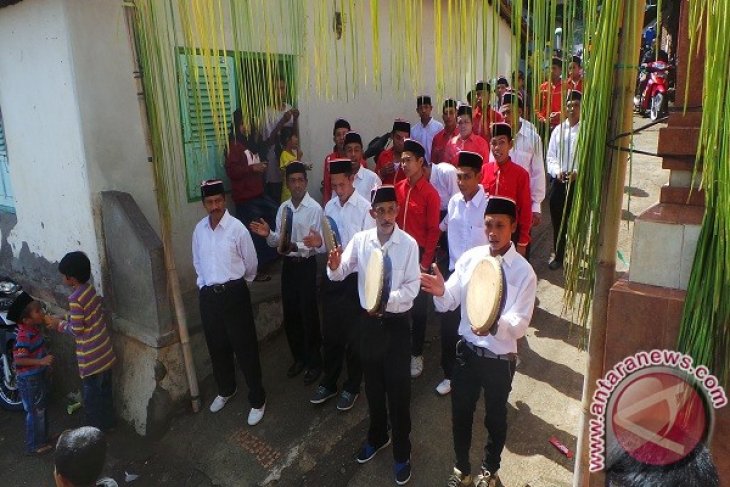
ILUSTRASI - Sekaa Hadrah menari tarian silat sembari diiringi tetabuhan rebana di depan masjid di Desa Pegayaman, Buleleng, Bali (Antara Foto/Bagus Andi/2015)(e011)



